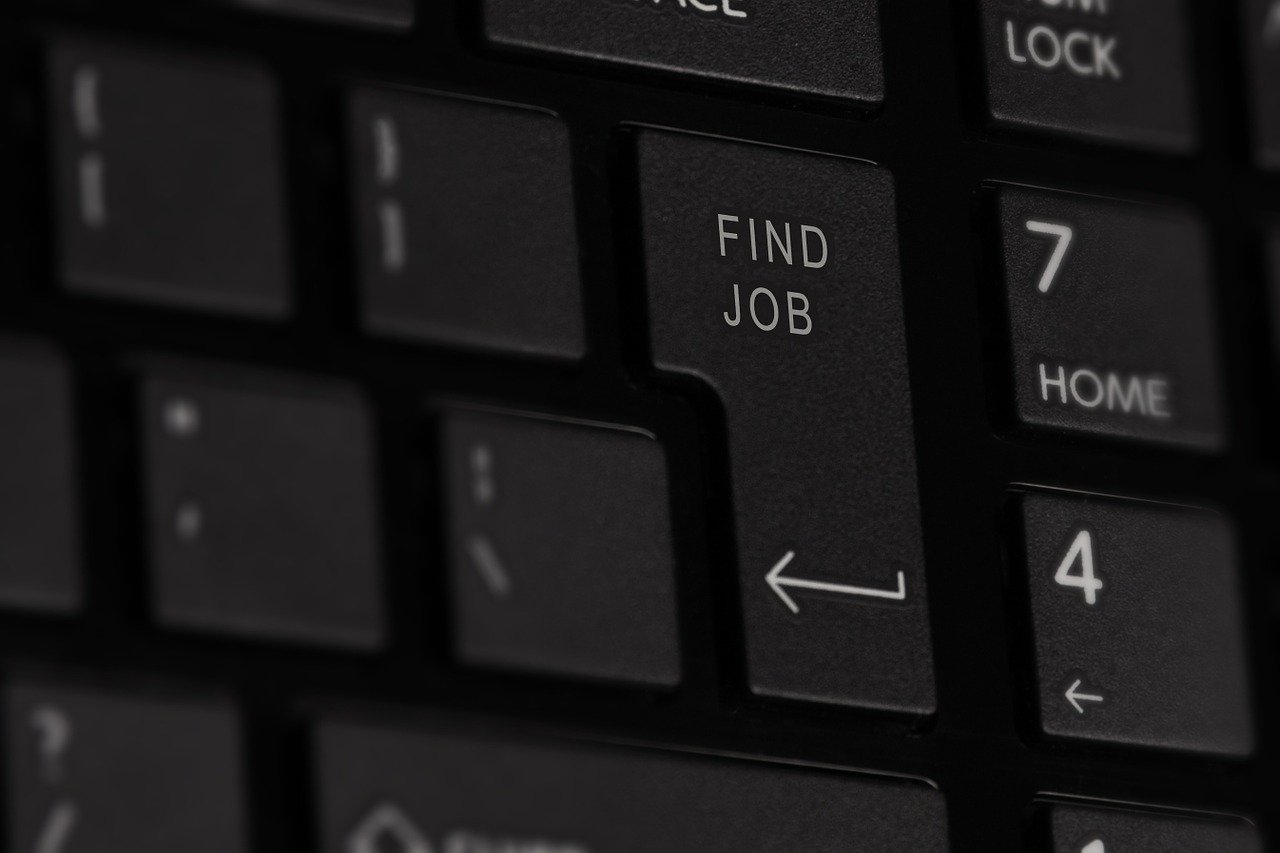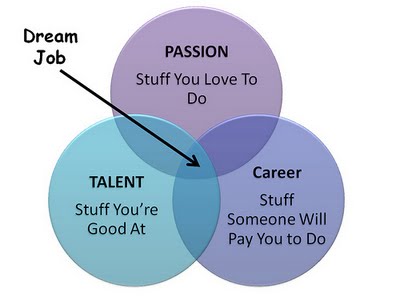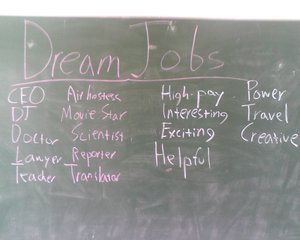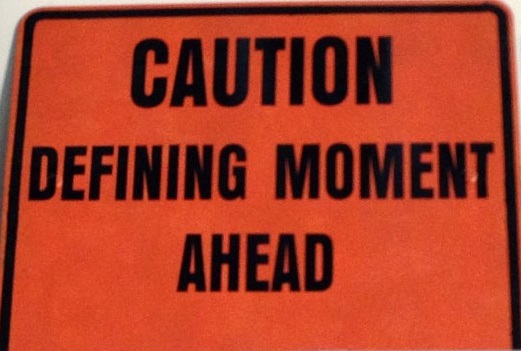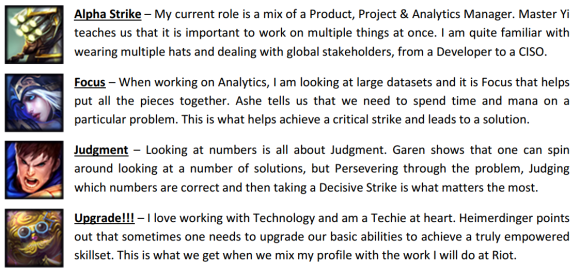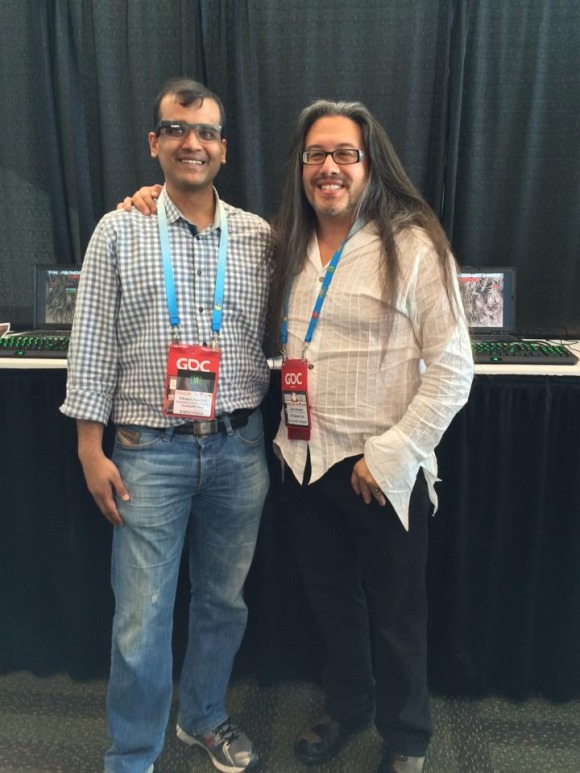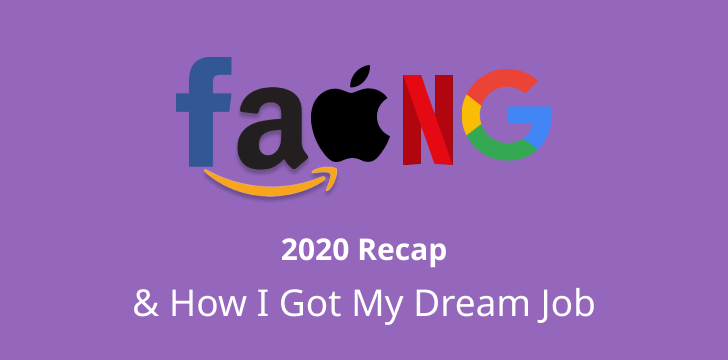How i got my dream job
How i got my dream job
How a simple cover letter got me my dream job
I didn’t expect to get my first job. In fact, I was completely hesitant about sending the application letter. It wasn’t feeling it. But as the famous line goes, there wasn’t much to lose.
You see, a friend had sent me the vacancy letter via WhatsApp and I immediately wondered why. The job called for an administrator but clearly, I am a writer (right?)
My first instinct was I wasn’t qualified enough.
He thought differently. One of the qualifications was someone who is jovial, and he was convinced I was a perfect fit. Even though there was a long list of strange responsibilities, no prior experience was needed.
I thought — okay, why not.
So I gave it a shot. I wasn’t going to get it anyway.
Before I sent my job application to the email address highlighted, the first thing I did was to research. I Googled the company as I knew little about them; it was simply a passing name. I even watched a few videos about how to write a cover letter and CV — because you can never know enough.
Using the new and old tricks I had learned, I wrote a draft outline and a couple of opening sentences. I picked the best opener, typed out the full cover letter and sent it to a friend for proofreading. Finally, I copied the contents of the cover letter to the email body (another tip I learnt online).
I sent my application with my cover letter and updated CV at 11.57 pm. 3 minutes before the deadline. And then I forgot all about it.
Two weeks later, it was my graduation day. The 4-hour ceremony had just ended (it was way shorter than it sounds) and I was seated alone under a tent trying to grasp what had just happened. This huge life moment felt like a speck to my little brain.
In my thinking solitude, I was interrupted by a call from an unknown number. I’m surprised I didn’t drop my phone; it was the CEO of the company I had applied to. He asked a few questions about me, sort of like a mini interview.
He called again the next day. I had the job.
Wait, what! How? I was excited but confused at the same time.
Why did they pick me? Was it my CV? My cover letter? Or both?
I didn’t find this out until later.
Now you should know, this was not the first job application letter I had sent out in the past few months. However, none of the recruiters had called me back, especially not on my graduation day! So what made this one so special?
There’s all this advice we’re given on how to sell ourselves to our prospective employer through an impressive email. But rarely do we get the job. It always goes to that guy who seems less qualified than you.
However, during this application process, I learnt some new tricks that helped me write my most unique cover letter, and get a job I wasn’t looking for. Since I am not (that) selfish, let me share 6 of them with you.
That is basically how I wrote my cover letter. As you can tell, I laid emphasis not on my impressive skills but on the company. 90% of the letter was about them — their goals and achievements. The remaining 10% explained how I have resonated with their vision.
A few days after my apathetic graduation day, I finally met my first boss. I had previously heard stories of graduates who got employed a day or week after leaving school — a strange feat in this modern world of scarce jobs and high youth unemployment. I just didn’t imagine it would happen to me.
My boss, by the way, was the friendliest and warmest guy I have ever met. Still is. He announced that I was going to be the editor, which is something I have always wanted to do for my blogger friends. So long administrator!
But the best part is that it’s a remote job. This means I work from home rather than in a cold office miles away in the middle of human and vehicle traffic. Yes, my bedroom is my office.
Sometimes you do get what you want when you’re least looking for it.
I was still curious. Why did he choose me among the pool of hundreds of young people like me who applied from around the country? He instinctively opened his email inbox and read it out in front of myself and a fellow writer.
My winning cover letter did not mention how good I was — I saved that for the CV. It was about how good I made them seem. People love to be flattered, and it seemed to have worked this time.
If only someone had told me this earlier, I would probably have gotten all the jobs I’d applied for before.
My application letter was just the ticket. Now the real job begins.
Getting My Dream Job by Linn Mollberg
Getting My Dream Job!
by Linn Mollberg
Getting a dream job can be a big challenge for anyone, especially if you lack professional experience or just recently graduated.
As a junior marketeer, I decided to leave Sydney where I completed my Bachelor of Business and worked for a healthcare company as a Marketing Associate for about one year. I wanted to go back to Europe and Sweden, to continue building a career closer to home.
Along the journey of getting my dream job, I met with the three founders of a startup called Novorésumé. They provide an excellent online tool for creating a resume using templates and various sleek designs. I also met with Zubair Quraishi who founded NemCV together with Franco Soldera. NemCV hosts workshops and seminars in Copenhagen, providing job seekers with the necessary tools for how to land a dream job. All share a passion in helping job seekers.
I thought I would jot down some of the key learnings from my personal experience and advice gleamed from attending meetings and seminars with Novorésumé and NemCV.
1. Know ‘what’ you are!
Many people, especially recent graduates with limited work experience have trouble knowing what they are, or more specifically which title they should use on their CV, LinkedIn profile and so forth. When I started looking for jobs, I used the title “Marketing and Business Development” because I wanted to work within marketing and help grow businesses. But these can be a bit vague and non-descriptive keywords.
I found out that I needed to decide what my title would be to optimize my chances of being found via search engines, using keywords and make it easier for recruiters to understand what I could do. I now call myself a “Junior Marketing Associate,” which is a clear indication of where I’m at in my career right now and what I can do immediately. You can only be one thing for one job, or recruiters will be confused and fail to place you in the right category to match you with the right job.
2. Tailor your resume!
The content you use for your resume may not fit all jobs you are applying for. It is important to match your resume with the requirements in the job advert to make sure you look like the best candidate for the job. Remember that getting the job you want is all about being better than the other applicants.
Tailor your resume to the job advert, and you will increase your chances of standing out. Using the same color scheme and font as the company you are applying for can help you to “subliminally” seem like you are a good match for the company.
Novorésumé provides an excellent online tool for creating a resume with various templates, by having the perfect balance between functionality and design. Their templates are developed in collaboration with HR experts, making sure all the necessary information will be present in your application. Visit Novorésumé and try it out.
3. When to contact the recruiter/employer
Contacting a recruiter is scary. As if writing a Cover Letter and adjusting your resume isn’t tedious enough! Paradoxically, when looking for a job you WANT to get rejected early! It is a competition to get a job and recruiters view you as an asset or liability, not as an actual person.
Getting rejected early means that you find out as quickly as possible if you qualify for the job, and spare yourself the hassle of writing Cover Letters and adjusting your resume. When you see a job that you are interested in applying for, call the recruiter and try to get rejected. For example:
“Hi, my name is Linn, and I’m calling regarding the job as a Marketing Associate for XYZ company, I saw in the requirement section that I need to have six months experience with CRM tools and be able to speak fluent Danish. I have attended a CRM course, and I am taking Danish classes two evenings a week. Do you think I should still apply?“
If the recruiter’s answer is “fluency in Danish is a must have requirement” you know that your chances of getting the job are low and you can immediately move on to the next job you are interested in. Alternatively, the recruiter may say “most of our clients speak fluent English, and it’s therefore not necessary to speak fluent Danish. However, knowing basic Danish is required for the job for internal communication. I suggest you apply for the job”.
By calling the recruiter, you will know whether it is worth the time to apply. Additionally, the listed requirements in a job advert are usually vague and don’t always make complete sense for the job. To call and to ask about “odd”requirements allows the recruiter to remember you, and he/she is more likely to review your application.
4. How to structure a Cover Letter by explicitly stating clear answers to requirements in the job advert
Writing a cover letter either takes time, or you start using the same format for all applications (with small changes). Based on my knowledge, many recruiters do not read cover letters as they are often long and full of meaningless information.
“No, I’m not fluent in Danish, but I’m currently taking Danish classes two evenings a week.“
Composing your personal letter succinctly shows that you are structured, and you provide the recruiter with a clear indication of whether you meet the requirements for the job.
5. Importance of social media and personal branding
Clean, Clean and Clean up your social media profiles! The recruiter will google you, and it would be a shame to lose the chance for an interview because of a picture posted of yourself completely smashed on a festival four years ago.
Keep your social media profiles tidy and consistent and allow the recruiter to get a clear sense of who you are. Make sure you have a LinkedIn profile and that it looks good. Copy the “format” of someone with an excellent profile, and you will improve the appeal to recruiters.
Choose a professional photo. If you are unsure of what a good professional photo should look like, I advise you to have a look at what type of photos other people use. For females, do not show too much skin or jewelry, as it does not appeal to female recruiters.
6. Build a website may increase your chances of getting noticed
Personal websites or professional portfolios are becoming increasingly used to enhance personal branding. A website will allow recruiters to get to know you better and communicate that you are an ambitious and driven individual.
However, make sure that your website is relevant, looks good and is free of any spelling mistakes. Whilst your website should be an asset make sure that it projects the right image, otherwise, you may fall flat on “trying too hard with bad quality.”
I recommend the following websites:
7. Write blogs
Being a good communicator is a valuable skillset. By writing a blog or an article about something you are passionate about or writing about the organization you want to work for, may increase the chances of you getting noticed. Using social media when reaching out to potential employers is a powerful tool. Below is an example of a direct message I could send to a manager at WIX, a company that I want to work for.
“Hi, I’m Linn, and I’m extremely passionate about personal branding and web development platforms! I have written a blog where I compare customer experience and value for Swedish development platforms versus international offerings. I have mentioned WIX in my blog. I think you may find the blog post interesting.”
Writing and sharing knowledge is valuable and people will appreciate you reaching out.
8. Timing matters, be first
Many applicants apply for the same jobs as you. A recruiter seldom looks at 300 resumes and Cover Letters, only the first ones in (unless they have a tracking system). To be first and get noticed, apply for the job as soon as they are listed. Do not apply for jobs that were listed 3+ weeks ago.
Alternatively, call the recruiter and ask if the position is still available. Subscribe to alerts using your keywords and location and keep track on daily job listings.
9. Do not get emotionally attached!
Companies and recruiters look at you as an asset or liability, not a person. Recruiters care about WHAT you are and WHAT you can do for the company. Not WHO you are (there simply is no time to get to know you before being selected for an interview).
Applying for jobs is almost mechanical/transactional, and you should not get emotionally attached to the job. Get rejected as early as possible so you can move on to the next job application, without wasting time applying for a job that you are clearly not qualified for.
We would love to hear your thoughts and ideas!
I Got My Dream Job – Here’s How You Can Get Yours
HIGH5: Austin, tell us a bit more about your journey, who you are, where you come from. How did Cultivated Culture come to be?
Austin: Sure! I created Cultivated Culture to share my job search path and tips I discovered during the process. Today it’s a community of 450,000 people that we have helped to get into the world’s best companies.
Trying to figure out my plan, I turned to my parents, career counselors, professors and they all told me the same thing – tweak your resume and apply online until something sticks. After going through this process, I realized that it was even worse than I expected because after applying to 300 places over the first three months I was left with no offers.
I quickly understood that I was taking advice from people who have been successful in their own right by playing to their own strengths but they haven’t been down the path that I wanted to go. This was my light bulb moment. So, I wrote out the criteria for my dream job. Then, I used LinkedIn to find people who met those criteria, emailed hundreds of them, jumped on calls with some, and tried to look for common threads and strategies that they used. These were the two core things that I took away from this experience:
Then I started testing out the tips I got. At first, I failed a lot but eventually created a system that allowed me to pick and choose which jobs I wanted to land interviews for. That’s how I got in the door with Microsoft, Google, and Twitter eventually accepting the Microsoft offer. When that happened, a lot of people came out of the woodwork to ask me how I got the position and I just had to share! That’s how Cultivated Culture was born just about four years ago. The rest is history.
HIGH5: You mentioned playing to your strengths when looking for a job. As a career coach could you tell us about your perception of strengths as something to put on a resume or something that you can leverage overall in the career search process?
On top of that, willingness to experiment is a huge strength to pay attention to. Many candidates just get out there and start sending out applications via an app and if nothing comes of it – they keep going. The ultimate goal is to figure out what channel gives you the best odds and to double down on it. So go send cold emails, put together projects to make a case, go to events for in-person networking. Then track how many interviews you got out of online applications vs. how many you got out of in-person networking.
The next step is to look back at this data every couple of weeks and decide what’s working. This process was really a core staple of my system and something I recommend everybody that I work with does. The people who are constantly experimenting with different channels and tactics, those who are keeping track of the results and integrating them tend to rise to the top.
HIGH5: As they say, “The definition of insanity is doing the same thing over and over again and expecting different results.” You truly never know what is going to work! Could you recommend strategies for discovering what you are good at that our community could use along with the test?
Austin: HIGH5 is definitely a fantastic starting point. It is great to be able to label what those talents are so you can start actively noticing when you’re using those strengths. On top of that, I think some of us don’t necessarily recognize that something is our character strength. So, when we are shown that through an empirical survey, we can read a paragraph describing what being a Catalyst really means and it all makes sense.
Another thing to do is to write out 10 things that give you energy and that you really enjoy doing in the context of the career you’re going for. This helps to align your job search with your strengths . Some love visiting clients and giving presentations but hate dealing with Excel and processing data. For me personally, this was extremely helpful.
HIGH5: Something you mentioned earlier was looking for people who work in your desired industry and have your dream career path. Would you say that looking at these role models and dissecting their character strengths can help you get an idea of strengths you should nurture in order to get where they are?
Austin: A hundred percent, that’s what I have my clients do in their exploration phase. It’s great for two reasons:
Once you build up that communication, they are in a prime position to refer you to somebody who could help you get your foot in the door. That’s what relationship building is all about and it works! Many tend to go right for the immediate goal instead of spending time building the relationship so this is a great way to change this strategy up and focus on something more long term and effective in the end.
HIGH5: Austin, thank you for having this conversation with us, it was a pleasure learning about ways to uncover and leverage your strengths in the context of career search. I hope more people turn to the strengths-based approach while navigating the job market in the “new normal”.
If you want to learn more about Austin and the ways to get your dream job without applying online, check out Cultivated Culture.
How I got my dream job
Trawling through 20,000+ job posts. Applying to 4,000+ jobs, giving out over 1000 business cards, talking to over 250 people on the phone for contacts and recommendations, and a 100+ interviews later, I finally have my dream job!
I generally get one of 2 reactions when folks hear the details about my journey.
1. Oh man, thats a lot of time and work. Really Commendable.
2. Man, you had to go through that much? You either didnt apply right or you didnt really fit the job profile, you got lucky!
To be honest, its a little bit of both and a little bit of neither. This post will detail my journey from start to end, and hopefully provide inspiration, perspective and most of all, clarity into how to apply for a job that you really really want.
This post is divided into 3 parts. My Background, my Journey and my Learnings. Feel free to skip to the end if you would like a TL;DR.
Before I get started with my story, I want to give you a little background as to how I came to this point. Hopefully, this gives you perspective as to why I made the decisions that I did.
Background:
Ever since I was a child, I was fascinated with computers. And since both my parents came from the software industry, I was fortunate to have my own PC growing up. From my very own 286, to a Win 95, 98, 2k1 desktop and so on. Hence, at a very early age (around 6th grade), I knew that I wanted to be a computer engineer. Hence, I joined the Pune Institute of Computer Technology to specialize in Information Technology (Bachelors in Computer Science). During my Final (Senior) year, I had to decide between 2 options. I could either give my MBA entrance examinations, for which I had been preparing for, for the last 12 months. Or, as a wise friend put it – “I was always interested in learning, why not apply for my Masters degree in Computer Science?”.
The Masters route made sense to me. I studied quickly for the GRE and got a decent score. Also, since I kept in touch with other people, I found out about the QS Graduate MBA tour. I was also looking at Dual MBA+MS degrees, so I flew down to Bangalore and met with some folks. It was there that I realized that a few MS colleges I had applied to, were also coming the next day. I stayed back and luckily, the dean of the CMU IS program agreed to interview with me the next day. I had also applied by then for an early decision. As luck or fate would have it, I received an admission offer from Carnegie Mellon.
I absolutely loved Grad School. It was everything I wanted and more. I took an extremely heavy volume of classes, because I was there to learn and almost completed a degree and half! 🙂
It was at Grad School that I learnt how to work a Job Fair, how to give Elevator speeches (15-30 second profile synopsis) and how to really write a good resume. I will forever be thankful to the efforts of our Career Services department and to Ron Delfine and Susan Timko in particular!
During my second year at Grad School, through some heavy networking, carefully choosing what papers I wrote and published, I received an interview and subsequent job offer from Deloitte and Touche. A few months later, I could have received an offer from a firm doing Social Media analysis, but I declined the interview.
Why did I decline the interview? Consulting fascinated me and at the time, I thought that it would be fun to work on varied projects. This would also help me decide what industry I would like to go into. Lastly, the fancy lifestyle and the fun of traveling also appealed to me.
I knew that I would love a job in Social Media and Analytics. But my rationale was, “I know that I love Social Media & Analytics”. Lets give consulting a shot, if it doesn’t work out, I can always switch. Hindsight is 20/20, but this is definitely not true! I will elaborate on this in the Learnings section.
Cutting a long story short, I started working in consulting (2010) and worked hard to build a network and socialized with many folks. I started planning to switch to a bank in a few years, since I realized that I like a) The permanency of projects and b) To be able to work through a project, from start to finish. In consulting, I never really got the satisfaction of seeing ones work being used and appreciated by other people, since you worked on parts of a project, never really on the whole.
As a side note, I had always assumed that I would apply for a MBA degree at some point in my career, as I always had this bent and interest towards working in Marketing. I find the concept of a MBA degree fascinating. I got a flavor of the courses and classes one can take during their MBA degree during my Carnegie Mellon days. And I find the coursework and the thought processes required, very interesting. Also,when I talk with MBA graduates, what strikes me the most is their clarity of thought and how eloquent they are. And these are traits I strive to inculcate in myself.
I was fortunate to receive an offer from Citi (2011) less than a year into my first job and I took up the same. However, this really threw my career plan into a toss. My plan was to work in consulting for 2-3 years, then work at a bank and then eventually apply for my MBA. However, since I got the banking opportunity a year or two early, I never got the chance to work in various industries. Hence, after a year and a half of working in banking, I wasn’t really sure what I wanted to do next …
And that’s where my journey begins.
What do I really want to do?
I started thinking about this between October 2012 – January 2013. These are the questions that plagued me all the time:
With my head muddled up with these thoughts, I started chatting with experienced people from the industry. I spoke with family and friends, with folks in their mid-30s in Management Consulting jobs to folks who are regional and global heads of businesses.
Eventually, after thinking and listening to them for a few months, I realized that I was trying to optimize everything and something had to give. I had to pick the 2 or 3 most important things, and let the rest be.
My decisions were:
Now that I had my well thought out reasons, I jumped into resume preparations.
Phase 1: Feb-Apr 2013 : Aim High
I decided to put some work in and applied only to a few top tech companies. Why? Because if I managed to get one of these jobs, I would not have to do a very long arduous job search, and hey, would I really say no to one of these tech giants?
I already had a workable resume by February, since I had been working on it since December. After
8 drafts, I was ready to go. I applied to the big tech firms. Contacted a few friends and got a few referrals. Applied to a few jobs on their website. And waited. And waited. And applied to a couple more. And waited …
By the time early April rolled around, I realized that this was going nowhere. I took a break for a month, since I had family visiting, before I jumped into the process again.
Phase 2: May-Jul 2013 : Put in the time, to do it right
Since Phase 1 didn’t really go well, this time I decided to go all out. Starting
15 May, I started calling up my friends. And their friends, who they introduced me to. I spoke to each one at length, 45-60 mins on an average. And not one or two people. About 15 people a week! So I worked from 9am-6pm and was on the phone from 6-11pm every night!
This helped me in a few ways:
After working on tons of applications for a month, I realized that a lot of the tech jobs were located in California. Hence, it would be much easier if I was a local candidate and maybe it would garner me a few interview calls?
I flew to California and worked remotely from there for 3 weeks. I was lucky to receive a few phone interviews and one on site interview, but nothing else. It was extremely frustrating to put in so much time and effort, and to have an onsite interview, but not get a job.
I was quite disheartened when I flew back to New York. Especially since the job I didn’t get was with Disney Gaming, and I really really wanted it. So when you hit the highs of really wanting something and don’t get it, the lows are that much lower.
Phase 2: August 2013 : A Defining Moment
I was back in New York and something about that gaming job was irking me, at the back of my mind. I realized that I had been looking at Tech Companies and at PM jobs all this time, I never looked at Gaming companies.
I am an extremely passionate gamer and have lived and breathed games all my life. It was as if a light went off in my head. Why not apply to gaming companies?
I decided to pay my way to the Digital Media Wire conference in NYC. And thats where everything changed for me.
I realized that Game / Tech Industry PM roles are not something you can switch to just because you have PM experience. Industry knowledge counts for 80%, PM skills are just 20%.
This really shook me up. It put everything I had been doing for the last 6 months into perspective.
I realized that I needed to know much more about the industry. Not only as a Fanboy, but also about what people really do, day to day and how they develop these products.
I also realized, that I know a lot about what is happening in the Tech / Gaming world, but that doesnt come across in a 2 page Resume. Thats when I decided to start a blog, GeeksMirage.com
Phase 4: Sep-Nov 2013 : Changing my Strategy
After thinking about all I learnt from the gaming conference, I realized that I needed to make a few changes.
Armed with this new arsenal, I started applying for jobs, again. I went all out, again. I started talking with many people and really ramped up my online job applications. I would spend 4 hours every other day, zoning out and applying for one job after another. A typical 4 hour session would result in me applying for at least 50-100 positions, while viewing over 200-400 positions. I also started using LinkedIn, to look at and apply to jobs.
Suddenly, I started getting more interviews. Slowly, but surely, I had one phone interview and another. The challenge was, they were coming from various industries. Banking. Consulting. Advertising. Digital Marketing. Technology. And I also happened to get a few second round interviews including Amazon. And a Google Onsite interview!
I worked my heart out to get these interviews. I was attending 8-10 meetup.com events a month. And more conferences, like Uncubed. I would come back from every event with a stack of business cards, and would add the names and emails into an Excel sheet. I would reach out to every single person. And I kept track of whether they responded or not, and I generally pinged them once again, a week later. Some worked out, some didn’t.
I especially worked hard for my Google Interview. I mean come on, it’s Google! I read up a lot about the job position and spoke to many folks from the tech industry about it. I brushed up on my basic tech skills, algorithms and what not. I even blogged about some of their big data systems!
I worked so hard to prepared for the interview. According to me, it went really well. It’s only hindsight that made me realized that a) I was overconfident about my interviewing skills and b) I definitely would not get a PM role, even if I got an interview for the same.
I realized that I would not get a PM interview, when I was flying back to NYC after my Google Interview, and the person next to me on the plane, had appeared for a APM interview (Associate Product Manager, the most coveted new grad position at Google). When he was telling me about the kind of questions he had prepared for, I realized that I would be totally unprepared for an interview of that nature.
I did not get that job. That was a breaking point for me.
Phase 5: Dec 2013-Jan 2014 : Screw it.
I was tired. And wired. Exhausted and Frustrated. I had tried everything, and I just could not get one job?! This is when all the doubts came into my mind. I’m not good enough, I don’t really have the skills, Another industry will never take me, I just simply have to do a MBA etc.
Luckily, this is when a friend of mine, introduced me to a game. League of Legends. And the game really appealed to me. I mean, the game really appealed to me.
And it was winter, nobody was hiring anyways. And it was vacation time. Plus the coldest weather ever in NYC. (Rationalizations to Self)
So I basically started playing LoL 30-60 hours a week. I would play after work and all the time on the weekend. And during my 10 day Christmas vacation, I spent some time partying and the rest playing LoL. This continued into Mid January.
I knew that I should start applying for jobs again soon. But I didn’t really feel like doing that stuff again. Plus I was having fun!
What got me out of this reverie? The thought of applying for a job at Riot, who created League of Legends!
I created a Fantastic cover letter (screenshot below), if I do say so myself. And I landed myself an interview with Riot. Unfortunately, it was one of those interviews that just did not go well, because I really wasn’t prepared for Math Puzzle and answer based questions. I had prepared myself for questions about analytics, technology, marketing and the gaming industry and did not expect questions on probability.
But the process got me charged up. And I also realized that I was running out of time. I had decided to put in a years worth of time. I needed to get a job by March, worst case April. If that didn’t happen, I needed to start studying for my GMAT to apply for a MBA degree, else I wouldn’t be able to do justice to that application.
Phase 6: Feb-Mar 2014 : The Final Push
Finally, I was charged up. And decided to use all of my experience to apply to jobs only in the gaming and tech analytics industry. Because this time, I knew that it was what I wanted to do.
I refined a final version of my Resume. I started emailing 5-10 HRs from every company which I wanted to apply to. I would connect with them on LinkedIn. If they responded in a day or two, great! Then I could send them a message for free. Else, I would send them an InMail. I believe, this is what made the big difference.
I suddenly started getting a lot of interviews. And by lots, I mean lots. I was chatting with 4-5 recruiters every week. Which was quite a change from the year before. The year before, I would constantly check my email to see if I heard back from someone. Nada. And now, I had to use Google Calendar to schedule all my interviews and calls, just so that I spaced them out well and so that I could keep track of my life!
I had also booked another trip to California and was going to attend the Game Developers Conference. I planned to be in Seattle the first week of March, working remotely. And then on vacation for 2 weeks in California, for GDC and for potential job interviews.
My week in Seattle was insane, to say the least. I gave 9 phone interviews that week. I would work from 6am – 2pm, then give
2-3 interviews. Relax for an hour, go out for dinner, then come back and prepare for next days interviews. What made it harder was that a lot of interviews were for drastically different roles. Analytics Manager, Advertising Analytics, Analytics Developer, Technical Analytics etc. Each required a different type of preparation, different background reading and it was hard context switching multiple times a day.
After this week and from other phone interviews, I was lucky to have 3 onsite interviews scheduled before I reached California. 2 with gaming companies and 1 with a Tech company. I wanted to be diligent and when I reached California, I went through all the emails I got from Recruiters / LinkedIn in the previous weeks (
30) and realized that this one recruiter had asked me to get back to her in a weeks time, since she was quite busy. And I had forgotten to email her back. I did so, had a great phone interview and I received a 4th onsite interview as well.
My time in California was nuts to say the least.
On Friday (Mar 14) I gave an Onsite interview in the Bay Area. On Monday (Mar 17), I gave an onsite interview in Los Angeles. On Tuesday (Mar 18), I gave a phone interview and then also an Onsite interview in the Bay Area. From Wed-Friday (Mar 19-21), I took public transport to GDC, networked all day and attended networking events after (8am-10pm). And then the next week, I gave another onsite interview as well as a different second round onsite interview.
I have to say, interviewing with these companies counts amongst one of the best experiences of my life! It may sound weird to some people, when I say that interviewing with a company is a memorable experience?! Well, for me it was. It was like coming home. Home to where people spoke the same language as me, where posters of memorable video game characters adorned the walls as opposed to popular bands and movie stars. Walking through the fancy glittering hallways, thinking about all the historic games created in these rooms, I simply had a blast visiting these companies and chatting with people from the industry.
After 3 crazy weeks, tons of traveling (NYC – Seattle – SFO – Sunnyvale – San Mateo – Los Angeles – SFO – San Mateo – San Francisco – San Mateo – Sunnyvale ……..), all via cabs and public transport. I was exhausted. But this was a different type of exhausted. I was having the best time of my life. Its hard to describe when you see everything that you ever dreamed about. From meeting John Romero (Creator of Wolf3D, Doom, Quake) to seeing the new Steamboxes, from visiting the crazy creative gaming offices to having long conversations with interviewers about our favorite games. Yes, I was definitely having the time of my life.
However, I was still crossing my fingers and hoping to get a job offer. I heard back from a few recruiters about receiving positive reviews and recommendations. However, my past interview experiences had jaded me and I wanted a confirmed offer. And then wait, I received an offer. And then I received another one. Me! I got two offers! Hallelujah! After all this time, 1.5 years of work, I had TWO whole job offers! I was ecstatic! Eventually, I chose one of them, where the work and game appealed to me the most!
The irony of the situation? The job that I got, my dream job, was with the biggest gaming company on the planet. Electronic Arts, EA. How did I get this job? By emailing back this one recruiter, who had asked me to get back to her, and I forgot to do so, when I was busy in Seattle.
What did I learn from this process?
But at the end of the day, what satiates my soul, is to work on something that I live and breathe. Something that puts a skip in my step when I go to work. Something that I can be proud of, and hold my head high when I say that I work at this company.
I hope this article gives you some food for thought into what to do and not to do in a Job Application process. And how to get that one job that you always wanted!
Feel free to comment on this thread and I will do my best to reply asap!
Adrian Mejia
This is the first time I write a post about reviewing a year. I usually keep my posts about technical topics or tutorials, but this year has been unusual so let’s do unusual things!
I spend most of 2020 preparing for job interviews and being interviewed (besides my day job). Since I didn’t have to commute to work anymore, I used the extra 2-3 hours for studying daily. It did pay off.
So here’s a little backstory that leads me to this point.
The dream
Since 2011, one of my dream jobs has been to work at Google. I was fascinated by the number of innovative products they released, the Ester eggs, free food, and amenities in the offices. So, I did manage to get an interview with them. But, unfortunately, I bombed my first interview very badly. I was transitioning from Electronics engineering to Software, and data structures knowledge was pretty much arrays and strings. My first interview was about a linked list implementation, so I had to improvise.
After my big failure, I still wanted to try again in the future. I knew I had to study computer science topics and learn Data Structures and Algorithms (DSA) for real. However, those topics are tedious to study on your own. Eventually, I got other jobs in Software Engineering, and I procrastinated studying DSA for years.
I had a dream, but I didn’t find the time to put in the work. In 2018, I had an idea to motivate myself. I started writing posts about my learnings. That way, I can keep myself motivated. I wrote a couple of posts: 1, 2, 3, 4, 5, 6, 7. I noticed it got some traction, so I got another crazy idea. Would people be interested in an ebook version of my content? Since It takes so much time to write a book, I had to see if people were willing to pre-buy the book. It turned out around 50+ people got interested and pre-bought the book! That kept me motivated to start the book. Halfway through, I had some issues rendering a PDF and ePub format. However, I didn’t want to let down all the (pre-)buyers that believed in me. So, I pushed through the finish line and delivered what I promised.
Tech Interview Process
In March of 2020, I got an email from a Facebook recruiter. So, I thought: Hmm, I’m ready! If I’m going to interview again, let’s do it big. I was aware of how hard the interviews were. So to maximize my chances, I applied to all the top tech companies I could and more, E.g., FAANG (Facebook, Apple, Amazon, Netflix, Google).
The first interview was with Amazon. It was an online assessment. I thought I was ready since I was studying algorithms on and off for a couple of years. I completed the first exercise about solving a problem with a Hash Map and some other things. The second problem was complicated. It was a graph algorithm, and I was able to do a brute force solution. Unfortunately, It was not good enough, so I was rejected. 😭
Lesson learned: to do well in interviews, you not only need to know the theoretical concepts, but you must be able to apply them quickly.
I doubled down on doing exercises to do better on my subsequent interviews in other companies. I was getting better after a couple of months of doing Leetcode.com exercises every single day. When I interview Facebook, I got two questions that I had to solve in under 45 minutes. There’s one that I had seen before (or at least was similar). However, I got nervous and only did the brute force solution. I was rejected again! Also, I was frustrated because I practiced hard this time and still ended up using the same brute force solution I knew before preparing.
Lesson learned: Learning is not a straight line. If you want knowledge to stick in your head, you need to use spaced repetition. Learn and quiz yourself again after a couple of days.
I started writing down my sticky points and learn from my failures daily. I kept a spreadsheet of the last time I attempted an exercise and how long it took me to finish it. After two months or so of doing that, I started seeing a noticeable improvement in myself. I was learning, and the knowledge was sticking with me for the long run.
My following interviews went well, and I got offers.
Interview Results
To sum up the whole process:
I accepted my dream job at Google!
NOTE: Even if you are interested in one company, interview at many. Having multiple offers gives your more room for negotiating.
After Getting the Job
There was a small problem. I have been mainly doing frontend development (Angular/Node/TypeScript/JavaScript) for eight years. At Google, I’ll be using C++. As you can imagine, search products need to be blazing fast and memory efficient. That’s when algorithms and C++ come in handy. I became a beginner once again but was very excited about all the new things I would learn.
I took a month off in between jobs. I used that time to study and get up to speed on C++. I read a couple of books on the topic and tried to solve algorithms using C++ instead of JavaScript. It helped me!
Once I joined Google, I kept learning. Everything was so jaw-dropping! However, everything was so different from what I did before that I felt overwhelmed by the number of new things I needed to learn. The programming language was new to me, and the build system, CI, version system (perforce/mercurial-like instead of git), and many internal tools. I made a list of new things and have been going through them. After a month or so, I feel like I can do things now. I submitted my first change to production, and my 2nd one is on the way. It’s great to work on something that billions of people use daily (including my family and friends). I feel like what I do matters. Of course, there’s so much to learn, but I’m enjoying the new journey.
Lessons learned from Tech Interviews
2020 Highlights
Algorithms
Open-source contributions in 2020
Books in 2020
Audiobooks in 2020
Games
Workout
Summary
Considering the uncertain global situation, there are still ways to use circumstances for good. For instance, we can use the extra time at home to study and spend more time with family.
Failure is natural when you go out of your comfort zone. Try to learn from your mistakes and keep trying new things until you succeed. Don’t give up on your dreams, and try to enjoy the journey. Always keep learning, and don’t be afraid of starting over.
Now, your turn!
Adrian Mejia is a Software Engineer located in Boston, MA. Currently working at Google. Adrian enjoys writing posts about Algorithms, programming, JavaScript, and Web Dev. Also, he likes to travel ✈️ and biking 🚴.




